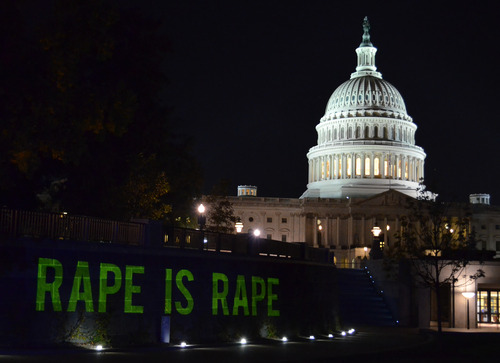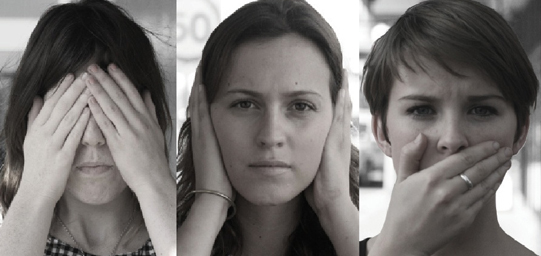Today, the 25th of November, is International Day for the Elimination of Violence Against Women. It is also the first of the 16 Days of Activism Against Gender-Based Violence. We know that the key to ending violence against women is establishing gender equality. In honour of the day, and the goal of eliminating all forms of violence against women, here are five social changes that I’d like to see:
- A society that’s comfortable with ambitious, assertive, loud, confident, opinionated women.
Women do not need to be demure, diminutive, self-effacing, softly spoken or modest in order to “earn” respect. In fact, women don’t need to do, or be, anything to deserve respect. Inalienable human rights mean that women, as human beings, are entitled to respect and freedom from violence no matter whether they abide by societal expectations of femininity or not, no matter whether you like, or approve, of their behaviour.
Nonetheless, women continue to be persecuted and discriminated against for behaving in ways that are considered unfeminine such as being ambitious, assertive or opinionated. The enduring gender pay gap, the sexist response to women leaders (here and here for just two of many, many examples of this) and the underrepresentation of women in parliaments, board rooms and positions of leadership are outcomes of an inability to accept the same qualities in women that we value in men.
I want to see a world where we can embrace all women, the feminine and the not-so-feminine. A world where the women who are bold, loud, bawdy, crass, ambitious, assertive, confident and opinionated are celebrated. Where neither fitting the stereotype, nor bursting out of it, holds a woman back from being who she is and achieving what she’s capable of. - “Use it or lose it” Paid Parental Leave provisions for the non-birth partner
Paid Parental Leave is a vital piece of social policy when looking at measures to increase gender equality.Women continue to outperform men when it comes to caring for children (and other forms of caring) at a rate exceeding 2:1. As a result, women experience myriad forms of financial inequality and discrimination: vast discrepancies in superannuation, the motherhood wage penalty, disincentives to return to the workforce embedded in the tax and welfare system. Any society that is serious about gender equality has to be serious about paid parental leave and childcare. We cannot continue to expect women to provide unpaid, unrecognised caring work and we cannot continue to exempt men from the responsibilities of caring.
The Australian Government is currently considering changes to the Paid Parental Leave Act which will reduce the amount of paid leave available to Australian parents to spend at home caring for their newborn. The changes will result in a cap of 18 weeks of paid leave available to Australian parents. These changes are unacceptable.
What Australia needs is a paid parental leave scheme that provides for a minimum of 26 weeks of paid leave to parents of newborns. A minimum of 12 weeks of this leave needs to be protected for the birth parent to ensure that time, without loss of income, is provided for the birth parent to recover from giving birth. Importantly, a proportion of this leave period must also be provided on a non-transferable, use-it-or-lose-it basis, to the secondary parent to promote the gender equitable sharing of work/family responsibilities. We need social policy that creates the expectation – for both employees and employers – that caring is a shared responsibility between women and men. - Mainstream cultural representations of enthusiastic consent
I want to see representations of enthusiastic consent as the standard, expected precursor to every representation of a sexual encounter. Mutual, enthusiastic consent is what comes before – and throughout – any sexual encounter. Consent is not just an absence of no, consent is not assumed or expected or coerced, consent is not vague or uncertain. Consent is an unambiguous, enthusiastic and ongoing yes. Mainstream cultural representations of sex need to be representing this as an obvious, necessary, and fun part of any sexual encounter.
Sex without consent is rape. A culture that represents sex without showing consent as a visible, audible, active and enthusiastic process is contributing to rape culture. It’s not too much to ask. In fact, it’s a crime not to. - Breakdown the gender binary – starting with children’s clothing and toys
Why is there a boys section and a girls section? Why are toys and clothes divided by gender? Why do we remain so determined as a society to separate, distinguish and contain the two genders? Why are tired, old stereotypes so hard to ditch? Why is it that children’s clothing and toys continue to be such a stronghold for tired, rigid gender stereotypes?
Children learn gender from the world around them and the world of children’s toys and clothing remains extraordinarily controlled by rigid gender stereotypes (in fact, gender stereotyping of toys has become more pervasive in recent years). By the age of 5 children have formed strong ideas about what is masculine and what is feminine but prior to the age of 5 children have flexible ideas about gender. This means we have an extraordinary opportunity to promote and teach gender equality by exposing our children to a world free from rigid gender stereotypes and one open to diversity and freedom.
What our children play with matters immensely. Play is how children learn and develop and limiting the types of toys our children have access to is limiting their opportunities to learn and develop. There is no excuse for holding back our girls or our boys by controlling their access to toys and clothing on the basis of gender.
Let’s let toys be toys and children be children. Let’s let our children determine what interests them, what they want to play with and how they want to dress. Let’s abandon limiting, destructive stereotypes and let all children have access to all colours, activities, toys and clothes. Let’s ensure all our children are provided with an equal opportunity to learn and develop. - Funding feminist organisations
I want to see a commitment from government at all levels to fund feminist organisations. As a beginning, all violence against women funding should be provided to organisations on a feminist basis. In light of the fact that the prevention and elimination of violence against women requires gender equality it simply makes sense that any organisation seeking to address the issue of violence against women works within a feminist framework and is underpinned by feminist values. It should simply be a prerequisite. Any government that wants to walk the walk about preventing violence against women and not just talk the talk needs to be funding, supporting and learning from feminist organisations.
The International Day for the Elimination of Violence Against Women gives us an opportunity to reflect on how serious we are as as society about creating a world where girls and women live free from violence. Awareness raising is not enough. We all know the stats, we know that violence against women affects 1 in 3 women worldwide, we know how pervasive and destructive this problem is, and remains, despite decades of global campaigns and coloured ribbons. And we know how to prevent it. We’ve known that for decades, too. The time has come to act. What change do you want to see? What will you do to create gender equality in your world?













